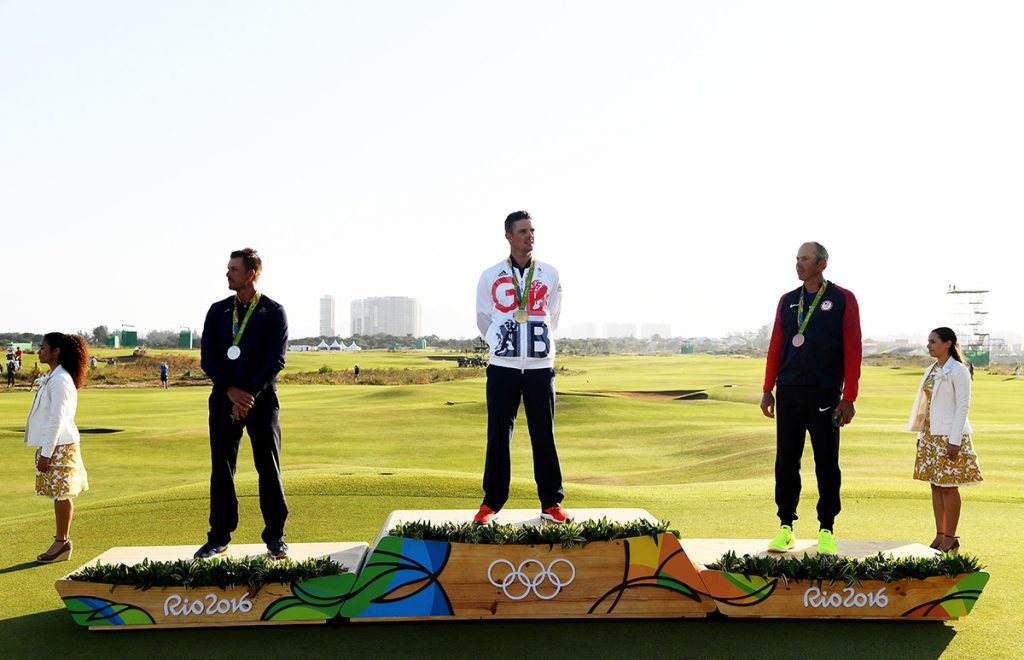THE Tour is extremely lucky to conclude our Race to Dubai Final Series at Jumeirah Golf Estates for the DP World Tour Championship. The facilities are absolutely world-class, including the European Tour Performance Institute, a superb state-of-the-art facility which many of our members use to practice and train. It also has a fantastic clubhouse and our relationship with golf in Dubai and the Middle East continues to grow each year. The players enjoy the course and the atmosphere. It really is a premiere location to showcase some of the best golfers in the world and we are proud of the event as it continues to flourish each year.
– KEITH WATERS, Chief Operating Officer, the European Tour, talks to Worldwide Golf about the exciting, burgeoning future of the Tour.
Worldwide Golf: The past 12 months golf has undergone a number of changes inside and outside the Tour. Is the Tour now well placed to take on the new global challenges ahead?
Keith Waters: We are very experienced in running golf tournaments and we will continue to do that as we look to showcase the game in the best possible fashion. We are in the entertainment and content business where golf is our platform, and if we can showcase our game in an entertaining light, then that is the best commercial we can produce to help grow our game and keep it successful in what is an increasingly crowded market.
Worldwide Golf: The change in the Membership for the players has become five European Tour tournaments – not including the four Majors and the four World Golf Championships. Has this helped to increase the number of players competing in Tour events?
Keith Waters: The European Tour is a unique organisation and we will always endeavour to put our Members – our stars – first and foremost in our minds whilst we look to build upon some of the great tournaments we have established over time. The reason for the change to five European Tour tournaments was to alleviate the problem caused for players who may not necessarily play in all four Majors or all four World Golf Championships events, whereas now, those who do not compete in all eight of those events still have the ability to maintain their membership, which has, in turn, been very successful for the Tour.
Worldwide Golf: How well is the Final Series working: by grouping the Turkish Airlines Open, the Nedbank Golf Challenge and the DP World Tour Championship together over three weeks in November with €22 million in prize money – is it attracting the players to compete?
Keith Waters: Where we sit right now, the Race to Dubai could produce one of the most thrilling finishes we have ever seen. For us, in terms of scheduling, it has been a year of consolidation for the European Tour and the transitional stage we are moving into now relates to a very different looking 2017 season, which is exciting on all fronts. The Final Series has always been attractive, it’s always been successful in getting the players to play. This year will be no different. We’re expecting strong fields in all three of those tournaments and to be honest, it’s only injuries that tend to stop our players competing because we have world-class golf facilities available to our Members, a large prize fund and an atmosphere that is enjoyable for their families and fans alike.

Worldwide Golf: As a former competitive European Tour player do you feel that the game can be speeded up by limiting the time it takes players to play their shot, particularly on the greens, perhaps by making their way to the next tee immediately after putting out, without introducing different formats?
Keith Waters: We have introduced some new regulations this year on the European Tour to monitor players, which has been successful in reducing slow play. In terms of all the arrangements of playing golf in general, the R&A and USGA are looking after the formalities in this area. The European Tour is incredibly supportive of playing more quickly and looking at innovative formats to get more people participating in and watching golf. We have a responsibility to be a leader in this area and to trial these new ideas that can impact the game positively.
We have also seen some exciting golf initiatives introduced over the past few months including The Hero Challenge at the British Masters supported by Sky Sports (pictured above), who committed to broadcasting night golf in prime time coverage. We all witnessed amateurs from the crowd being offered the chance to ‘Beat The Pro’ at the KLM Open in Holland, and we saw the Pressure Putt Showdown return for a second time this year. These are all entertaining events conducted over a short period of time whereby people can engage with the Pros and as these opportunities continue to develop over time, I can’t wait to see what else we can add to the agenda in the future.
Worldwide Golf: You still compete at a high level as an amateur when you can but can you see the day coming when you will be playing 9-hole events instead of 18 holes?
Keith Waters: For me personally, I enjoy playing 18 holes, but 9 holes is certainly becoming more commonplace. The R&A have an initiative already where there are some 9 hole competitions, and they will qualify for handicap purposes, so they are also encouraging people to play in 9 hole events.
Worldwide Golf: Time seems to be much more precious than it used to be. Do you feel that the average amateur golfer cannot spare the time to play golf after work and seldom at weekends when there are so many demands on his time?
Keith Waters: There is certainly more pressure and demands on people today, and there is also a lot of choice available to people who want to play sport. I don’t think it’s just golf that is in this situation because it is a challenge for all sports to grow participation and to keep people interested and involved, whatever the sport may be.
Worldwide Golf: While interest in golf is dwindling in countries where golf has been a tradition for many years, yet in countries relatively new to the game it is increasing – has that long been the case?
Keith Waters: I would argue that interest in golf isn’t dwindling in these countries, it is just that people are participating in our sport in different ways and playing different forms of golf, whether it be going to a driving range, or trying out some of the new short courses that have been developed. There are plenty of ways to play golf that don’t include playing a full 18 holes. We have always looked to playing our golf tournaments in different countries to help develop and grow the game.

Worldwide Golf: The Olympics in Rio attracted huge interest on and off the course in TV viewing figures – and particularly the head-to-head battle between Henrik Stenson and the victorious Justin Rose – but will it have a lasting benefit for the future of the game?
Keith Waters: There is no doubt that the return of golf after a 112 year absence was considered a success and something that will be of benefit to our game for the next four years and beyond. Not only did the event itself create interest for new audiences, but the golfing bodies behind those countries are now more interested in developing facilities and taking the game to the schools for their kids. It will take time but we have always believed the Olympic Games would help grow the game and we were delighted with the success it generated in both the men’s and women’s competition.
The growth in participation levels is particularly important for the sport and with the level of international exposure that an Olympic Games creates, we hope it brings the ability to reach multiple demographics, cultures and countries. It has helped provide another platform for us to explore golf’s place in the market, and, in a way, it’s a very similar scenario to what we produce week-in -week-out at the European Tour, given our global nature and the fact that we have a presence in 27 countries.
Worldwide Golf: It’s been good to see Ras Al Khaimah hosting the penultimate event on the European Challenge Tour with the NBO Golf Classic Grand Final in Oman coming the following week, adding another European event to the UAE and Middle East – how important is the region to the European Tour?
Keith Waters: The UAE region has been critically important to the growth of the European Tour over the past 25 years and, in particular, Dubai where we have been fortunate to enjoy a superb relationship since our first visit way back in 1989. Dubai has an ideal climate, fantastic golf courses, great hotels, and we are able to travel there when it’s difficult to play golf in Europe due to weather. It has been a huge addition to the Tour that has contributed considerably to our ongoing success.
Worldwide Golf: The European Challenge Tour has long been the nursery to the European Tour but its success in breeding champions seems to grow year on year – what do you put the success of the Challenge Tour down to?
Keith Waters: The Challenge Tour is highly competitive in terms of the players who have lost their cards and the new players who are coming through trying to make their way onto the European Tour. The added bonus for the players is that they are playing four rounds at all tournaments, so they are conditioned and ready to take the next step. Getting used to that lifestyle of playing week-in, week-out, 72 holes, is incredibly important and was the original intention of the Challenge Tour, to replicate what they would experience when playing the European Tour.
Worldwide Golf: Do you feel that the Tour has a bright future ahead and that it is making good progress.
Keith Waters: We are trying to make the game more interesting by improving the quality of the content and the entertainment experience for our fans. The European Tour hosts 47 tournaments in 27 different countries. We are working in different cultures, and dealing with different types of business practices to grow the game, which means that with so many new avenues and exciting projects, our future looks different, in a good way, because we want to lead our sport through this exciting period.
















